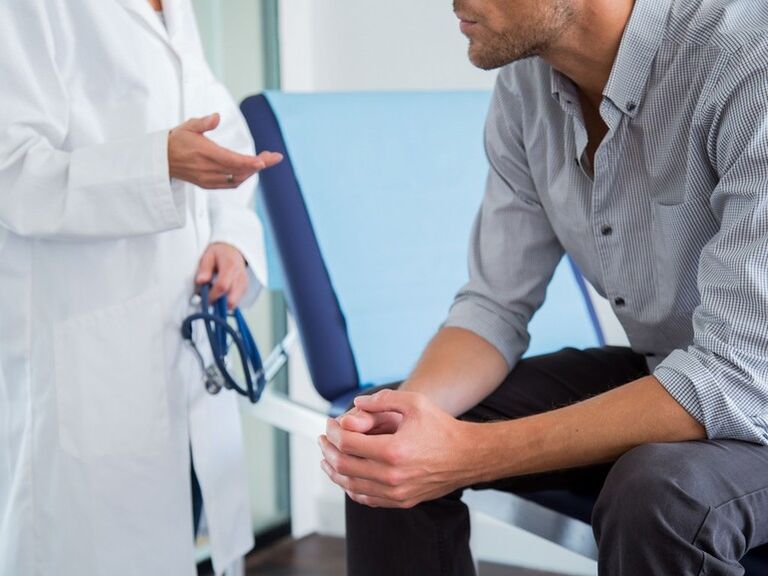The prostate gland, ie inflammation of the prostate, usually obtains a chronic course, regardless of the cause of the disease. In order to achieve effective treatment of chronic prostatitis, you need to know how much it appears.
Good health, dear readers. Alexander Burusov is an expert at the Viva Man Men's Club and we continue to understand the problem of chronic prostatitis, its causes, symptoms and treatment.
In this article, we try to figure out what is better treated with this terrible illness, what options are available. Let's start analyzing the most modern and effective methods of treating prostatitis in men.
What is prostatitis?
Prostatitis is called inflammation of the prostate gland. This can occur as a result of immunity, infection, hypothermia, stress, inactive lifestyle, active or vice versa, as a result of entering the body.
Prostate iron or prostate is part of a male reproductive system. This is the basis of the urethra. The size of the prostate is comparable to the size of the nuts. The main function of this organ is to develop a secret that is responsible for the activity of spermatosoids.
There are 4 types of illness:
- Chronic bacterial.
- Chronic, is not related to the formation of bacteria.
- Chronic asymptomatic.
- Spicy.
All the other types of prostatitis do not have pronounced manifestations, so diagnosing them is always difficult. The main symptoms of chronic disease types are as follows:
- Lower abdomen pain (can be given at the back).
- Empty from the urethra (can be transparent or turmoil).
- Sexual function disorders.
- Far -heart urination.
Prostatitis can be asmptomatic and is diagnosed only on test results. It can be formed in a person over 25 years of age. After 35 years, the risk of development increases significantly, and at the age of 45, the likelihood of diagnosis of prostatitis is 50%. Therefore, during adulthood, the urologist should be examined annually, which promotes the detection of the disease early and begins treatment in time.
Diagnosis of the disease
Only one urologist can determine the presence of prostatitis. After the inspection, you may call for further examination:
- Physical testing is a prostate palpation in which the condition and size of the gland can be determined.
- Transrectal ultrasound.
- Analysis of prostate smear or secret to the presence of leukocytes and bacteria.
- Clinical urinary analysis containing protein, leukocytes and bacteria.
- Ejaculate analysis.
- Cytological urinary analysis.
- Bacteriological urinary analysis.
- Analysis of the dog's protein level.
- Urodynamic examination.
- Cytoscopy. It can only be ordered if there are signs, in the event of injury or in the event of the operation.
Causes and aggravation of the disease
The inflammatory diseases of the geniturinary system, due to the close contact with the rectum and the prostate gland, lead to inflammatory focus. The prostate nourishing vessels are branches of the bladder, the rectum, the rear artery, the deep artery of the thigh. The infectious focuses available in these organs may fall into iron.
The presence of chronic infection of any localization, such as nasal cavities, leads to a weakening of immunity, and conditionally pathogenic microorganisms that are available in the intestine and urethra become pathogenic. This leads to the formation of the chronic process.
The prostate gland circulation violation due to blood stagnation due to reduced physical activity background to the deterioration of drugs in the prostate gland and complicates chronic prostatitis in men.
The increase in the bloodstream of the organs in the pelvis is due not only to low physical activity but also to many factors:
- irregular sex life;
- interruption of sexual intercourse;
- smoking, alcohol;
- The varicose of the lower limbs;
- paaproctitis and proctitis;
- thromboflebitis gold medium in the background of chronic hemorrhoids;
- cracks and fistulas of the anus;
- The sound of the vascular wall is regulated by the sympathetic and parasimptic nervous system, the disease of which is interfered with by the flow and outflow of blood;
- Trauma with the foot among riders, cyclists, riders.
In the case of sexually transmitted urogenital infections, the disease does not always be healed - this is the cause of chronic prostatitis. The most common pathogens:
- Trichomonas;
- Mycoplasmas;
- gonococci;
- Gardnerella;
- Ureaplasma;
- Chlamydia;
- mushroom;
- viruses;
- E. coli;
- Streptococci;
- Enterococci;
- Staphylococci.

These microorganisms are difficult to cure.
Hormonal activity gradually fades in one person after 40 years. At first, asymptomatic.
Decrease in testosterone production again and again leads to a slight stagnation of prostate secretion in its granules. Little by little, this stagnation increases. The materials in the secretary of the prostate are not completely removed. The barrier function of secretion of secretion, engine, prostate gland begins to suffer.
The prostate juice performs a cymonic acid bactericidal function and dilutes it. The stagnation of citric acid is not enough and the bacterial infection develops. The level of citric acid in the prostate juice is directly related to the amount of testosterone in the blood.
A clinical picture of the disease
Symptoms of chronic prostatitis in men:
- Feeling of discomfort, pain over the pub;
- Pain shoots regularly in the rectum and sacrum;
- Increased urination and pain, especially after hypothermia, stress;
- not typical discharge;
- Violation of ejaculation, erection;
- Early ejaculation;
- increased sweating;
- impaired sleep;
- Periodic growth of body temperature is up to 37, 2-37, 3 0 c.

What symptoms dominate: pain, urination or sexual disorder - men's chronic prostatitis depends.
The main components of the treatment of the disease
The main areas of treatment should be highlighted:
- drugs;
- normalization of work and relaxation system;
- rational nutrition;
- rejection of bad habits;
- Filoalization, massage;
- Folk medicines.
Drug treatment
Effective treatment of prostatitis should be directed to eliminate the cause of prostatitis. The drugs are selected separately by a doctor after the necessary diagnostic tests have been performed. Analyze how and how to treat prostatitis once you have acquired a chronic form. Main direction of medication:
- antibiotics;
- anti -inflammatory drugs;
- Loneliness to improve urine outflow;
- Urantizeptics to eliminate the infections of the urinary system;
- preparations that improve arterial and venous bloodstream;
- Medicines that improve fluidity, reducing blood viscosity;
- vitamins;
- enzymes;
- sedatives, psychotherapy effects;
- correction of immune disorders;
- Treatment of metabolic diseases and hormonal dysfunction.
Antibacterial therapy
Regardless of the healing of chronic prostatitis, the well -koszal depends on antibacterial therapy. It is important to note that therapy and treatment of prostatitis will become as effective as possible when determining the type and stage of the disease.
Antibiotics are selected by those that penetrate the prostate well and effectively affect the pathogen. Certain pathogens of chronic prostatitis, such as ureaplasma, are not sensitive to strong drugs such as:
- tetracycline;
- some cefalosporin;
- levofloxacin;
- Clarithromycin.
No -steroid anti -inflammatory drugs
The effect of non -steroid anti -inflammatory drugs (NSAIDs) is related to normalization of the permeability of the vascular wall and the restoration of microcirculation. They reduce education and do not allow existing inflammatory mediators to be absorbed. We must remember the wealth of the NSAIDs, we form ulcers in the stomach and in the duodenum.
It is best to use rectum candles with NPs such as indomethacin.
Normalization of blood flow with drugs
Normal bloodstream is achieved with the appropriate diameter of arteries that bring blood to the veins that come from the blood flow of oxygen. In addition, blood viscosity and good fluidity on the capillary canal should be reduced.
In order to achieve good results in the treatment of chronic diseases of the prostate, inflammatory diseases of the urethra, bladder and kidneys should be treated. Medicines are used for this purpose:
Prostatitis inevitably reduces efficiency, weakens libido, and disrupts erection. These phenomena are always accompanied by symptoms of disforia, reduced mood background and mood fluctuations. These symptoms prescribe sedative, anxiety and antidepressants.
Phytotherapy
It is known that herbal medicines are an alternative to many diseases. Can you cure prostatitis with the help of? Very often, doctors recommend the use of herbs (Licorice, Nettle, Bass, Plantain, St. John's Wort, etc. ) to improve the metabolic processes of the prostate. All of these plants contain a lot of selenium and zinc. However, these should only be used as part of complex therapy. As a general rule, the decoction of these herbs is used for baths.
Physiotherapeutic influences
The following methods of treatment for the chronic process are used to influence the prostate:
- ultrasound
- electrophoresis;
- Baths with hot water, chamomile, linden, sage, thyme;
- Warm -up
- Prostate massage through the rectum;
- Hirudotherapy
- UHF;
- inductothermia;
- Microwave resonance therapy.
The degree of the severity of psychological abnormalities and depressive manifestations depends on how chronic prostatitis is treated. Physiotherapy methods should be added to accelerate the treatment process in the absence of contraindications.
Nutritional recommendations
The usual recommendations for all chronic diseases are fried, salty, praised, smoking, and in this situation they are not sufficient in the form of denial of praise. Effective treatment of prostatitis depends on rational, balanced nutrition. Foods such as celery, ginger, turmeric, apits should be added.
Contain:
- Silicon that normalizes the formation of hormones in the body;
- Vitamins B, remove toxins and restore redox processes;
- Chromium, germanium, selenium, zinc normalize the work of the sympathetic and parasimpatic system;
- Vitamins C and normalize cell membrane permeability, have antioxidant properties;
- Extremely amino acids, omega 3 that renew sexual function.
Apitherapy uses: natural honey, peg, wallet, jelly jelly, dead bees, Bee pollen.
Folk treatment
The process of treating chronic prostatitis is complemented by compulsory herbs that should take into account these mechanisms of the disease. Then the effect of therapy is fully achieved.
It is possible to use the following herbs:
- nettle, sage, stubborn;
- Mint, Plantain, Hernica;
- Lace endowment, kick mucosa, worm;
- Thyme, birch, Linden flowers;
- Successful sunken, chamomile, motherwort.
The cure for chronic prostatitis depends on the prolonged use of herbs, in combination with the contradictory curses of the schema.
They use decoctions, infusions for oral administration, baths, and micro -glves. The use of tinctures, that is, alcohol -containing drugs is not recommended. This prevents successful treatment of chronic urogenital diseases.
All of these drugs have a good effect on the treatment of prostatitis in inflammatory, stagnant, hormonal etiology.
Prevention
Healing prostatitis is better to tell the urologist after examining the patient. But, like any other illness, prostatitis can be prevented more than getting rid of the consequences of the disease. This is necessary:
- Lead an active lifestyle. Regular sports prevent stagnant phenomena of the pelvis and improve blood circulation. It has a good effect: swimming, sports, dance, fitness. At the same time, Power Sports should be avoided.
- Care for proper nutrition. It is worth limiting the amount of fried, salty, greasy, spicy, pickled and smoked foods. The diet is based on fresh vegetables and fruits, dairy products, cereals. It is important to follow the drinking system.
- Avoid random sexual relationships.
- Maintains regular sex life. For a middle person, the norm is several times a week. This contributes to the natural massage of the prostate gland, which significantly reduces the risk of spreading various bacteria.
- It is important to avoid hypothermia.
- An examination of a urologist must be conducted every year.
After 35 years, all people are required to monitor their health as the risk of prostatitis is increasing during this period. To prevent the disease, it is important to implement simple preventive measures and regularly undergo a medical examination to help identify the initial pathology when easy to treat.
































